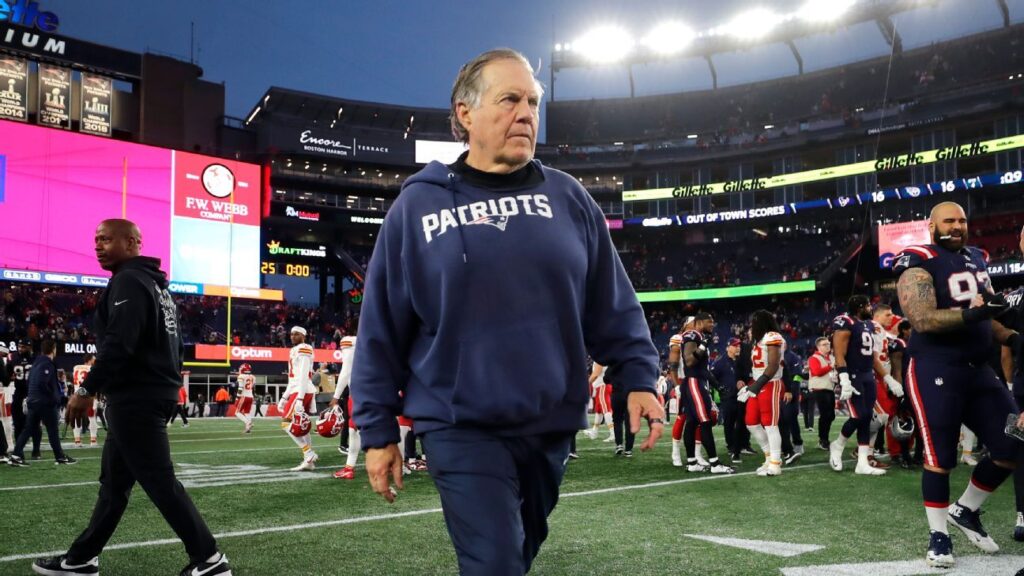North Carolina has sent shock waves across both the NFL and college football landscapes as it has finalized a deal with six-time Super Bowl champion Bill Belichick to replace Mack Brown as its next football coach.
Needless to say, we have questions.
Just last year, when a surge of assistants — and multiple head coaches — left the collegiate ranks for the NFL, some thought that would become an ongoing trend as college football shifts further away from amateurism and more toward a professional model. Belichick, at age 72, has done the opposite, and he joins his former assistant — first-year Boston College coach Bill O’Brien — as head coaches in the ACC.
Though Belichick has no experience coaching college football, his hire brings a level of panache that even a national championship coach such as Brown could not bring. Super Bowl championships will do that for a coach. A program that has been mostly average over the past four decades, UNC football has played second fiddle to its hoops team. Perhaps the name recognition alone will begin to change hearts and minds about how serious UNC is about altering the football narrative, and the wins and losses on the field.
So how exactly will this work? What are his biggest challenges? Why UNC? Our reporters weigh in. — Andrea Adelson
Jump to: What CFB fans need to know
Biggest challenges | Recruiting impact
Why UNC? | Playoff chances

What should college fans know about Bill Belichick that they might not from watching New England Patriots games?
He is as much Professor Belichick as Coach Belichick. He loves to teach, taking after his late mother, Jeannette, who spoke seven languages and taught at Hiram College. So those who have played and coached under Belichick have often described the experience as getting a doctorate in football, and that extended to media members in news conferences at times. While Belichick was notorious for being tight-lipped when speaking to reporters about anything he believed compromised competitive advantage, he would often discuss at length the history of the game. He has a soft spot, in particular, for special teams, “situational football” and UNC alum Lawrence Taylor, whom he coached at the New York Giants and calls the best defensive player in the history of the NFL. — Mike Reiss
What will be his biggest challenges going to the college game?
Fair or not, one of the main reasons the Patriots moved on from Belichick was the belief that the players coming into the NFL respond more to a relational type of coaching style. So this will put that belief to the test: How will his old-school, bottom-line coaching approach resonate with today’s student-athletes? — Reiss
There is a reason former NFL coaches sometimes have difficulty as college head coaches, and vice versa. Though college is moving more toward an NFL model with revenue sharing and the transfer portal, one of the biggest differences is everything on a coach’s plate beyond coaching his football team. Belichick is going to have to deal with the board of trustees, boosters and donors, and fundraise more than he has ever had to — that includes the traditional spring speaking circuit to drum up support and interest in North Carolina football. At UNC, in particular, football is not the top sport; basketball is, and fan interest in football often wanes if the results are not there. Even in the best of times, UNC football has a hard time selling out its stadium and generating the type of fan interest that automatically followed the Patriots. Then there is the world of recruiting — which includes the transfer portal — and sitting in the living rooms of 17-year-olds and their families to convince them to play for him, beyond just rolling Super Bowl highlights. There will be questions about playing time, academics (uncharted territory for Belichick) and, of course, NIL and revenue-sharing payments. — Adelson
Belichick says he wants to run an NFL program at the college level. What does that mean for the portal and recruiting?
In the near term, Belichick’s hiring will come with an immediate litmus test for his pull in the transfer portal market and on the recruiting trail. North Carolina has seen a handful of starters enter the portal during the program’s weekslong coaching search, most notably left tackle Howard Sampson, left guard Aidan Banfield, center Austin Blaske and linebacker Amare Campbell. Will any of those players withdraw from the portal to play for Belichick? If not, can he find high-level replacements for multiple holes in his starting lineup? As for high school recruiting, three of the nine members of the Tar Heels’ 2025 class remain unsigned after the early signing period. If Belichick can retain those commitments — most critically the pledge of ESPN 300 quarterback Bryce Baker — it’d mark a positive start on the trail.
However, the bigger picture of Belichick’s ability to recruit high school prospects and build a roster in the portal era stands as perhaps the most fascinating piece of his move to North Carolina. College programs are beginning to look more and more like NFL front offices, embracing NFL-style models of advanced scouting and roster construction as the power dynamics between coaching staffs and personnel departments shift in the NIL/revenue-sharing era. In that sense, there has never been a better time for Belichick — one of the sport’s greatest roster builders — to land in the college ranks. Outside of Colorado’s Deion Sanders, there’s now no bigger name in college coaching. But Belichick’s allure with modern college athletes and his appetite for the still-relational business of high school recruiting will be tested, and it’s worth noting as well that North Carolina is far from the only school that will be pitching itself as an NFL program at the college level.
What exactly that looks like under Belichick and the results it produces are what will ultimately matter for the Tar Heels. Regardless, the decision to appoint Belichick marks one of the latest and most substantial signs yet of college football’s ongoing march from amateur athletics to a professional model. — Eli Lederman
How surprising is it that UNC is the place Belichick returns to coaching?
Extremely surprising. UNC has been described as a “sleeping giant” in broad terms because it has the potential to reach another level in football. But over its vast history, UNC has not quite been able to do that enough — even under Hall of Fame coach Mack Brown. Twice. In his first tenure, Brown took the Tar Heels to multiple 10-win seasons and elevated the program, but it did not win any championships. In his recent tenure, Brown took the Tar Heels as high as a No. 10 ranking and developed two NFL quarterbacks in Sam Howell and Drake Maye but failed to win 10 games in any season over the past six years. Since 1997 — the final year Brown coached the first time around — the Tar Heels have one double-digit win season (Larry Fedora, 2015). North Carolina has not won an ACC title since 1980, and there are reasons for that. Expansion has added more football schools to the league, while others, such as Clemson, have invested far more in football. At its core, North Carolina remains a basketball school, and its funding efforts will remain as such. While it appears UNC should have everything in place to win — nice facilities, great recruiting area, a history of producing NFL talent — the Tar Heels have simply not been able to do it consistently enough. Hall of Fame coach or not. — Adelson
Can Belichick and UNC actually make the playoff and/or win a title?
Absolutely. Belichick might actually be one step ahead of his peers, even though this is his first foray into a college head-coaching job. Now more than ever, college coaches need to operate their programs like the NFL, with money, deals, moving roster parts — everything Belichick made a living on at the pinnacle of the sport. Plus, he can fill his staff with assistants who can specialize in all of it. His name alone will draw NFL-caliber players, because who wouldn’t want to compete for a Super Bowl-winning coach? Add all of that into the fact that the 12-team CFP is likely to grow to 14 or 16 teams in 2026 and beyond, and it would be more surprising if UNC didn’t compete for a national title. — Heather Dinich





